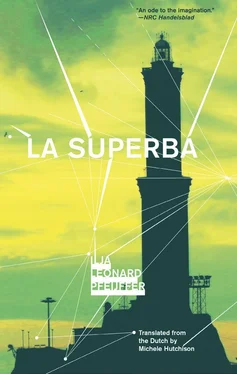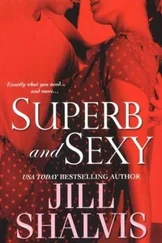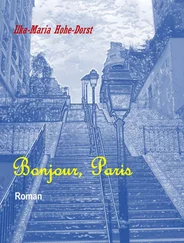While they continued their conversation, I could observe both of them close up under the pretext of being interested in the topic of conversation. It was fascinating to realize that, objectively seen, both of them were approximately the same age but had totally different ideas about it. The signora was wearing a long white linen dress, too, but that was only because it was August and unbearably hot. She looked well-groomed and elegant, no one could take offense at her, but the dress didn’t suit her one bit. She had the body of a potato. But the time she worried about such trivialities was decades behind her. She was an authentic potato. She was the ideal granny. She would never forget a birthday and would always find an appropriate, original, and sensible gift. She was direct in speech, didn’t mince her words, and in her carefree, uninhibited way of formulating things, she was sometimes very amusing.
Monia happened to be wearing a long white linen dress too, but the cut was so elegantly and exaggeratedly simple that it was clear it must have been so elegantly and exaggeratedly simply designed by someone with a name, and that it had probably cost a fortune. It fell perfectly over her scandalous body. A nonchalant slit displayed the long arabesque of her climbable legs. She kept herself nipped in with memories of her perfect figure. And her décolleté was downright criminal. You could see from the wrinkles on her breasts that they were real, although many a porn actress would furiously call the plastic surgeon at the sight of her.
She had a very unusual way of talking. She formulated her sentences with exaggerated care, like someone who was trying too hard to hide the fact that she were drunk. That was probably the case. She tried to sip her cocktails chicly, but sometimes she forgot and accidentally downed her glass in one gulp, after which she ordered a new one, not forgetting all the forms of politeness Italian is so rich in. And all this time she kept her eyes as wide open as possible, as though she wanted to insinuate a facelift.
“Ilja Leonardo,” she said, “I have always wanted to meet a famous poet. And this, itself already invaluable, privilege comes at not an inopportune moment for me, as tomorrow I have the great pleasure of having been invited to a simple dinner by two acquaintances whose lifestyle is characterized by a fervent interest in art and poetry. Consequently it would be rather felicitous to find myself in a position of being able to boost my dubious reputation by making a good impression with an artistic dining companion.”
She got up and wandered haughtily into the labyrinth with the exaggerated firm tread of a person trying to hide her drunkenness. The signora shook her head. Though I thought I had a dinner date, I wasn’t a hundred percent sure of it.
12.
Monia’s friends lived right next to Palazzo Spinola. It’s one of those places where old and new Genoa overlap in an improbable manner. Centuries ago, this was one of the most aristocratic neighborhoods of the city, where noble ladies lay sighing under high ceilings, hoping feverishly that Genoa might finally lose a war and that the invasion of brutal soldiers with bayonets and barbaric passions would arrive. Some of them are still lying there behind their exquisite paneling. Some of them still sigh in the shimmering heat of the midday hour that brings old spirits back to life. Meanwhile, the neighborhood has been flooded with Moroccan scum, whores, and human traffickers. But history melts away in the heat. What was still the future five centuries ago is now the memory of yesterday’s dreams. Everything has changed but nothing has changed. The sharks and fallen women of yesteryear are still here. The streets sweat. The age-old walls drip with damp. High heels click on the cobblestones. Rats dart away. The night groans.
Monia’s friends were almost irritatingly civilized. We were received in the drawing room, where we were invited to sit on antique furniture that was so conspicuously antique that you didn’t dare settle your full weight on it. Fortunately, we were expected to stand up again almost immediately to admire the collection of paintings. This was an examination. I was lucky enough to recognize a Flemish master. I was rewarded with a minuscule aperitif of something pricelessly exclusive. Once we’d savored that, we were directed to the dining room, where there were more paintings to admire, as well as the table silver. I felt more and more uncomfortable, as though I were trapped in a porcelain grotto. But Monia seemed to feel at home in this environment, even though she gave the impression during the starters of trying to hide the fact that she was well on her way to being drunk. I seemed to be the only one who noticed.
“My friend Ilja Leonardo is a poet,” Monia said.
“What kinds of things does he write, then?” the lady of the house asked.
“Poems,” Monia said.
The main course was Ligurian-style rabbit with potatoes and olives. An exclusive red wine was served with it. And I had reached my limit with the whole show. Controverting all the rules of etiquette, I grabbed the bottle of red from the table to top off my glass. It meant I’d never be invited here again, but all the better. Unfortunately, it had the opposite effect. They enjoyed my uncouth behavior. I was probably the first person in five centuries to break the iron laws of courtesy in their house. I was a poet, wasn’t I? I’d nicely proved it with this sudden act. Laughing, they put six bottles on the table. Monia seemed even more delighted about this than I was.
And gradually the mood changed, but in a way that made me feel increasingly uneasy. The conversation became unmistakably less formal and soon reached a level that almost made me miss the earlier formalities. The word “libertine” occurred to me, and that’s not a word that ever occurs to me. Because let’s face it, what does that word mean to us — seasoned modern perverts that we are, grunting pigs wallowing voluptuously in the filth of a degenerate world. “Libertine” is to us what “naughty” is to a spent streetwalker. But I was in a different world than the one you and I feel at home in. Here the decline of morals was a traditional and pre-planned part of a successful soiree. And that was why there was an unsettling charge to it.
The lady of the house began to turn more and more emphatically toward her husband even before the dessert, whereby Monia and I automatically became a kind of couple. I didn’t know how to handle the situation. After dessert we were invited to partake of a digestif in the study. It was a room that had been closed up to that point and which turned out to house a wonderful collection of pornography. Rare nineteenth-century picture books, antique figurines of Priapus, a Greek vase with a representation of a symposium, and an impressive collection of stereoscopic photographs and viewers. The lady of the house went to slip into something more comfortable for the digestif. She came back wearing exquisite lingerie.
Monia involuntarily saved the day. She was so drunk by now that denial was pointless. She took off her shoes with a lot of wiggling, fell over, but landed by chance, more or less, on the chaise lounge, upon which she immediately fell asleep. When the lady of the house shook her awake, she grabbed one of her pumps, groaning, and began to vomit into it. This was a signal to me that it was time to leave.
But that was a whole song and dance, too. Although I was prepared to take to my heels in a scandalously cowardly fashion, I still had just enough decency left to realize that I was expected to take Monia home. I managed, with the help of the gentleman of the house, to get both her empty shoe as well as her puked-in shoe onto her fishnetted feet. We hoisted her upright and pushed her into the lift. In the meantime, I said my goodbyes to the lady and gentleman of the house. “Well,” they said, “we’ll be seeing a lot more of each other.”
Читать дальше












